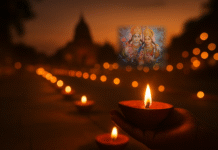Spiritual life is a progressive activity. As we grow we realize its value better. Being seniors by age or by experience in spiritual life naturally carries its own advantages. We become more mature, more sensitive to others’ needs, more stable in our thought process, more fixed up in devotional service, and so on.
Along with these and many other advantages come a host of risks and disadvantages. They could be social, physical, mental or spiritual.
Age is a definite factor. When young we may plan many things for retired life but often we don’t realize the challenges coming along with an old body. For example, one may plan to spend more time doing pilgrimage when he retires but by the time he retires he may have developed certain bodily condition that may not allow him to move around easily. Or someone may plan to read more books to immerse in spiritual life at old age but by the time she gets old she may lose the ability to sit in one place for a long time or suffer from eye disorders.
Loneliness is another challenge. Old people often lose attention of the younger generation and this could make them feel worthless, ignored or annoyed. Watching youngers getting into wrong habits can be painful. Impending inability to earn during old age could take away one’s peace of mind, even during young age when he may be earning enough.
Faith deficiency is yet another factor. Nowadays old people often cannot fully trust their children for reasons we can appreciate. Disability and dependence on others for basic movements is something no sane person wants to experience. Humiliation faced during old age could pose a tough test to one’s wisdom. Some old people may also feel insecure for not being able to adapt to modern lifestyle. There are more challenges people face as they grow older.
But what I am referring to here as the “biggest danger” is more subtle in nature and often ruins one’s life without his or her knowledge. While this danger is faced by almost all seniors, it is specifically dangerous to those who are progressing in their spiritual life. This may sound weird because generally, as we become senior we are supposed to be more advanced due to experience and the sadhana we performed in the past.
Right, it is weird and that is one reason we tend to ignore it or completely miss it even when we are in the middle of that particular situation. There is something called etiquette. Among civilized human beings, it is common not to point out faults in seniors. The reason is, although there could be exceptions, generally young people are not as wise as elderly people due to inexperience, hence they fail to see good reasons behind apparently outdated thought process of the seniors. Certainly, seniors are expected to know what they do but, after all, they are also human beings and prone to make mistakes.
Among spiritualists, there are two types of seniority: 1) by age and 2) by spiritual status. If a person has spent more time in practicing spiritual life, he is considered senior to those who are older than him by age but have spent less time practicing spiritual life. The etiquette of not advising such seniors is considered crucial especially among spiritual practitioners, and while it is recommended that juniors don’t prematurely try to advise seniors, oftentimes this becomes the biggest disadvantage in senior devotees’ spiritual life as they lose the opportunity to get corrected.
Hardly anyone likes to be corrected, and quite often this tendency takes further prominence when one becomes senior. But seniors are not beyond the four defects of conditioned living entities and if they are left with themselves then there are ample possibilities of them falling down.
There is another danger. Sometimes seniors get used to constant praise and forget that they are imperfect beings prone to making mistakes. Gradually they get attached to praise, honor, prominence, and dislike their criticism, even when it’s well meaning and helpful. Such bewildered seniors tend to belittle their critics and assume that whoever points out their fault is envious, inimical or politically motivated.

Yet another danger the seniors face often without their knowledge is their own overconfidence. Seniors generally think that they know better than juniors. While this may be true in most cases, it is not a rule. If they are unwilling to accept good advice then they become the loser.
Then there also is a rare scenario that we must not ignore. While generally a senior not willing to be corrected is due to false ego, there could be cases when a senior does not like to be corrected by juniors, not because of false ego but for the juniors’ sake. This may sound like holier than thou but there could be genuinely humble and advanced devotees who are concerned about junior devotees committing offense by criticizing seniors without understanding their motives. Such criticism becomes a stumbling block on the path of that junior. Some seniors try their best to protect juniors from such offenses. But in both the cases, the seniors run the risk of losing good advice when they make mistakes.
While the risk of juniors committing offense is real, the dangers referred to above are also real. As mentioned earlier, a junior may be advising a senior out of good intention but may not be knowing the reason why the senior acts in a particular way. On the other hand, a senior may have made a mistake and looking for counsel but the junior may not advise him or her out of etiquette. So sometimes it’s a catch-22 kind of situation.
Often in a spiritual society, senior devotees, especially sannaysis and spiritual masters are considered beyond faults by their juniors regardless of their actual spiritual status. The same equation applies here; catch-22. While it is important that juniors and disciples do not jump to conclusions and try to correct their seniors, sannyasis and spiritual masters, it is equally important for those senior devotees, sannyasis and spiritual masters to get corrected when they make mistakes. Unfortunately this doesn’t happen due to reasons mentioned above and so these seniors remain unchecked and tend to fall in Maya’s traps. This is the biggest danger.
There could be two ways to resolve this. Either the seniors take extra humble position and allow juniors to point out their mistakes, even apparent ones, and do not take any offense, or they somehow or other find superiors to keep a check on them. The latter option is more desirable, more beneficial and the safest.
So far correcting spiritual masters, it is a tricky situation as Vedic scripture strongly advise disciples not to consider their spiritual master an ordinary person. If a spiritual master who is not an uttamadhikari lives alone with his disciples, he faces a big risk of not getting corrected when he is wrong. Again, the only solution is to stay in association of seniors who are spiritually qualified to correct such spiritual masters. This remains true for all spiritual and religious organizations. For example, in a worldwide society like ISKCON, we can see how the different scenarios described in this article are real, how ISKCON deals with them, and how, when there is a failure, it suffers serious consequences.
One very important clarification. People who believe that there is no bona fide gurus in the world today after Srila Prabhupada physically left the planet should not become elated by reading this post coming from me. It is not that my eyes have opened and I have started realizing some faults in ISKCON and its leadership. I am aware of many issues within ISKCON involving its leaders and gurus, and I am also aware of different interest groups working hard to defame ISKCON gurus and the GBC. This post is not meant for faultfinding and mudslinging; it is meant for pointing out dangers in spiritual life of senior devotees.
There are situations in the material world when a spiritual master may not be an uttamadhikari and beyond faults. This is the reason Vedic scriptures and our previous acharyas talk about how to deal with defaulting spiritual masters. If all spiritual masters were to be always beyond four basic defects of conditioned souls and always fully absorbed in Krishna consciousness then the acharyas would not have explained to us how to deal with gurus who fall from their spiritual position. However, it is an entirely different topic not within the scope of this article.
In conclusion, although being a senior is good in that seniors are supposed to have more experience, more sadhana and more wisdom to their credit, it is dangerous for them not to be corrected when they make mistakes. For this it is imperative that seniors keep themselves under check by their superiors and as far as possible do not live in a place surrounded by only juniors and disciples. That will benefit all.
Hare Krishna



























